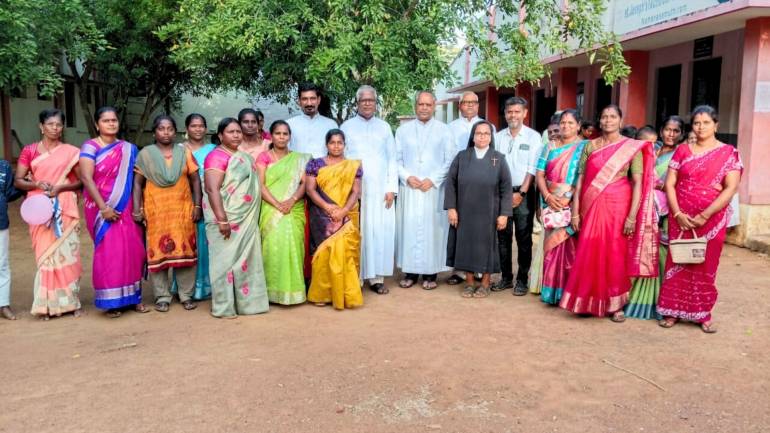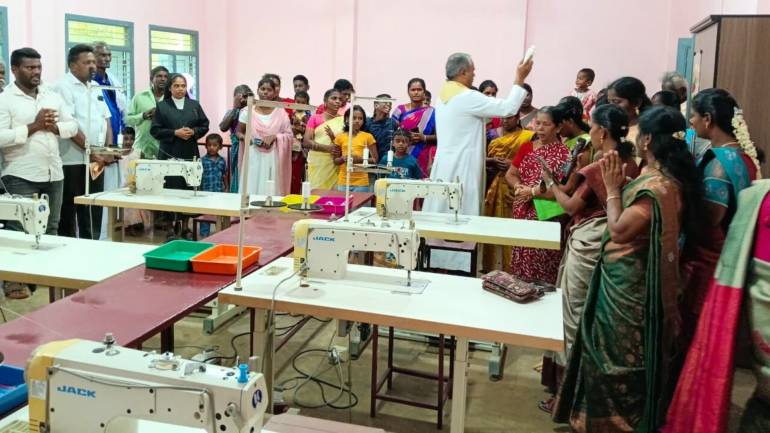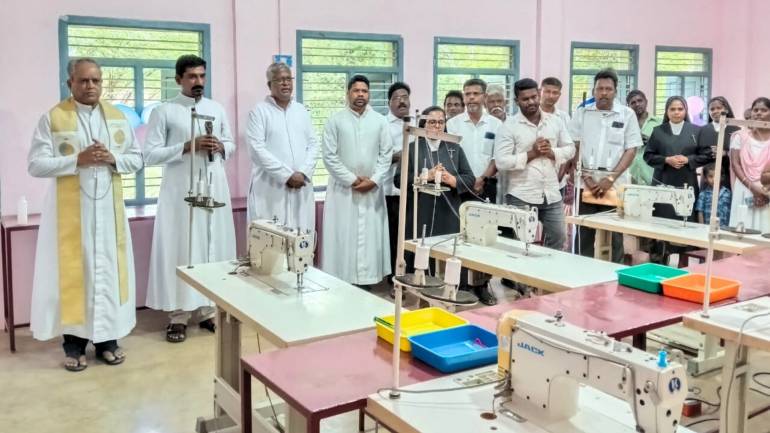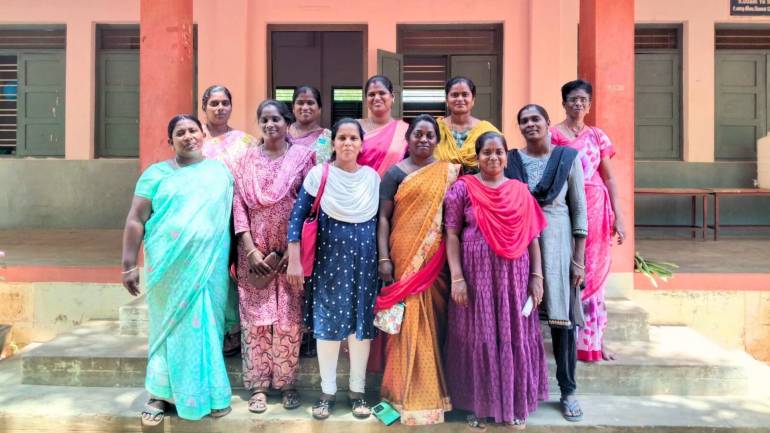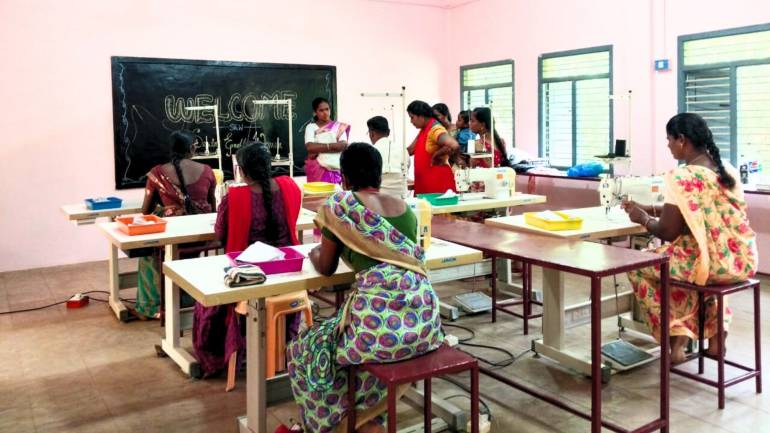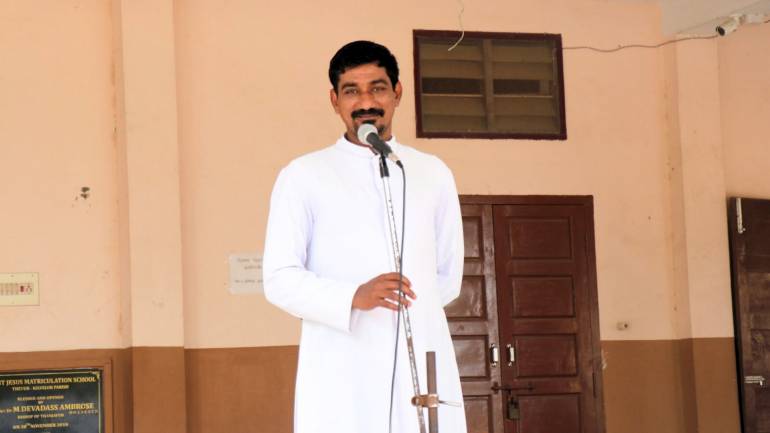Needles of Hope: Empowering Women through Carmel Rani Stitching Unit
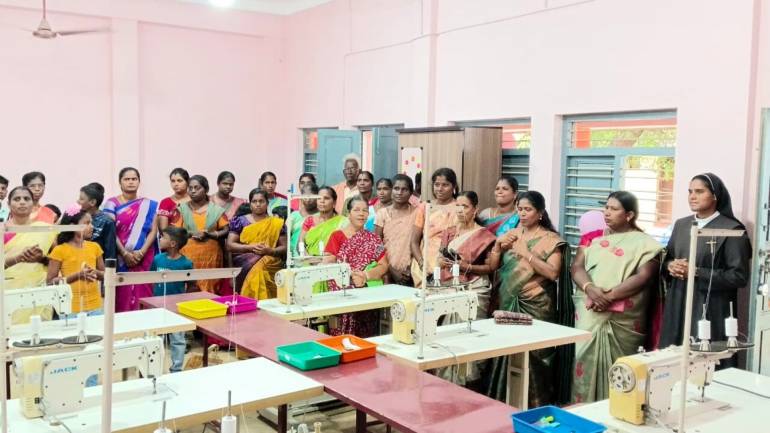
A church-run stitching unit in a rural parish in southern India has become a beacon of hope for women seeking empowerment and livelihood skills.
The Carmel Rani Stitching Unit, a joint initiative of the Diocese of Thanjavur in Tamil Nadu and the Sisters of Our Lady of Mount Carmel, was formally inaugurated by Bishop T. Sagayaraj on July 12.
The unit is located on the campus of St. Joseph’s Industrial Institute, under the jurisdiction of Infant Jesus Parish Churchin Namanasamudram. The inauguration ceremony was attended by Fr. Savarinayagam, Vicar Forane of the Pudukkottai region, Fr. John Peter, the parish priest, several Carmelite Sisters, and over 200 enthusiastic parishioners, for whom the unit has brought new joy and hope.
Speaking after the blessing, Bishop Sagayaraj explained the inspiration behind the initiative: “I personally believe that empowering women through skill training and employment is the best way to uplift entire families. When a woman earns money, it is almost certain to be spent on the family for food, clothing, and the education of children.”
It was the bishop’s idea to launch the stitching unit on the campus of St. Joseph’s ITI. Once a vibrant institution training over 200 students annually, the institute had seen enrollment drop to fewer than 10 in recent years, resulting in underutilized buildings and space.
“This way, we make effective use of the space and facilities while rendering an important ministry for the empowerment of rural women,” the bishop noted.
Namanasamudram parish lies at the southern end of the diocese a region that has not seen any major development initiatives for years. That is now beginning to change.
“Besides the stitching unit, the diocese has other plans for the campus too. We are going to start a small health center here soon,” the bishop announced, drawing cheers from the crowd.
Currently equipped with six sewing machines and supported by 14 women volunteers, the Carmel Rani Stitching Unit operates out of a classroom within the institute. The women, divided into two groups, are undergoing training that ranges from basic to advanced tailoring. While most have rudimentary stitching skills, they are only familiar with manual sewing machines. The program aims to build their confidence, teach them to operate electric machines, and enhance their skills to meet professional standards.
Mr. Bhaskar Antony, a parishioner and skilled tailor who previously worked as a quality supervisor in a textile export company, is overseeing the training.
“Our women are naturally talented. All I do is fine-tune their work and help them adapt to new machines,” he said.
Once the training phase is complete, the unit will move to a larger building currently under renovation. The new facility will accommodate more machines and enable the hiring of additional women from nearby villages.
To ensure sustainability, Bishop Sagayaraj signed a formal Memorandum of Understanding (MoU) with Sr. Jancy Valunkal, Delegate Superior of the Sisters of Our Lady of Mount Carmel, based in Kalamassery, Kerala. While the diocese provides the infrastructure, the day-to-day operations will be managed by the Carmel Sisters, represented by Sr. Sajimol, who will serve as the unit’s manager.
A trained tailor herself, Sr. Sajimol has experience running a similar unit in Kerala and holds a master’s degree in social work.
“I have a deep passion for this ministry,” she said. “There are many talented women in this area, and we have access to the materials we need. I’m confident this unit will succeed.”
The stitching ministry aligns deeply with the mission of the congregation. As Sr. Jancy, the delegate superior, explained: “One of the very first missions of Blessed Maria Teresa Scrilli, our foundress, was to start a stitching unit for girls. She believed that teaching them to sew was about more than skills it restored their dignity, gave them self-reliance, and nurtured their spiritual growth. Even when the congregation was suppressed during political turmoil in Italy, she continued teaching with a needle and thread in hand. That small stitching unit became the seed of our mission.”
Even before training is complete, the unit has already begun receiving orders. A local church-run school has placed an order for uniforms, while an export company based in Bengaluru, Karnataka, is in talks with the unit for a long-term partnership. Meanwhile, the Basilica of Our Lady of Health in Vailankanni an international Marian shrine has placed a monthly order for eco-friendly cloth bags.
“This is very good news,” said an elated Sr. Sajimol. “Now that we have orders, we’ll soon begin production and ensure that the women receive a regular salary.”
To help meet the growing demand, Bishop Sagayaraj has donated additional equipment to the unit, including five sewing machines, an overlock machine, and a steam iron box.
“We are so thankful to our beloved bishop,” Sr. Sajimol said. “With this new equipment, we can hire 10 more women. We’re now confident enough to take on new orders.”
“We are truly grateful to all our collaborators and donors who made this mission possible,” she added.
Fr. Savarinayagam, who played a key role in establishing the unit, believes this is only the beginning: “Our bishop has a special love for this region, which has long been neglected. He has many plans for St. Joseph’s ITI campus. With its existing buildings, open space, and proximity to the highway, it’s ideal for new projects. A health center is on the way, and I hope a Nursing College will follow soon.”
Until recently, a large cotton mill in the area provided employment particularly to women. Its sudden closure left many families struggling, with few job opportunities in the vicinity. For women with young children, commuting to towns was not an option.
Just as hope seemed lost, the Carmel Rani Stitching Unit arrived as a blessing.
Chitra, 50, said: “It is truly a blessing. I want to thank our bishop, our parish priest, and the Carmel Sisters for starting this unit. It has brought us hope and a sense of purpose. We’re now using our skills in a meaningful way. The little income helps us run our homes.”
The unit is open to anyone with interest and basic skills, regardless of religious background.
Manjula, 45, a non-Christian, shared: “At first, I was hesitant. I wasn’t sure they would accept me. But when I asked Father, he said I was more than welcome. The training has been very helpful. I’m grateful to the Church for doing this for the women in our area.”
Vimala, a widow raising a 12-year-old child with special needs, was tearful when asked how the unit has helped her: “I can’t explain how much it means to me. For a single mother with a special child, this job is a God-given opportunity.”
Fr. John Peter, the parish priest of Infant Jesus Church, will oversee operations on behalf of the diocese. With years of experience in education and development, he shared: “For me, pastoral work is not just organizing spiritual activities. To build a truly empowered community of believers, we must also focus on social development. The Carmel Rani Stitching Unit is a significant step toward that. This is only the start. I hope to see my parish grow spiritually and become actively engaged in social transformation. I want us to become a model community.”
With a bishop deeply committed to the poor, a visionary parish priest, dedicated Carmel nuns, and a supportive lay community, there is every reason to believe that this vision will flourish.





